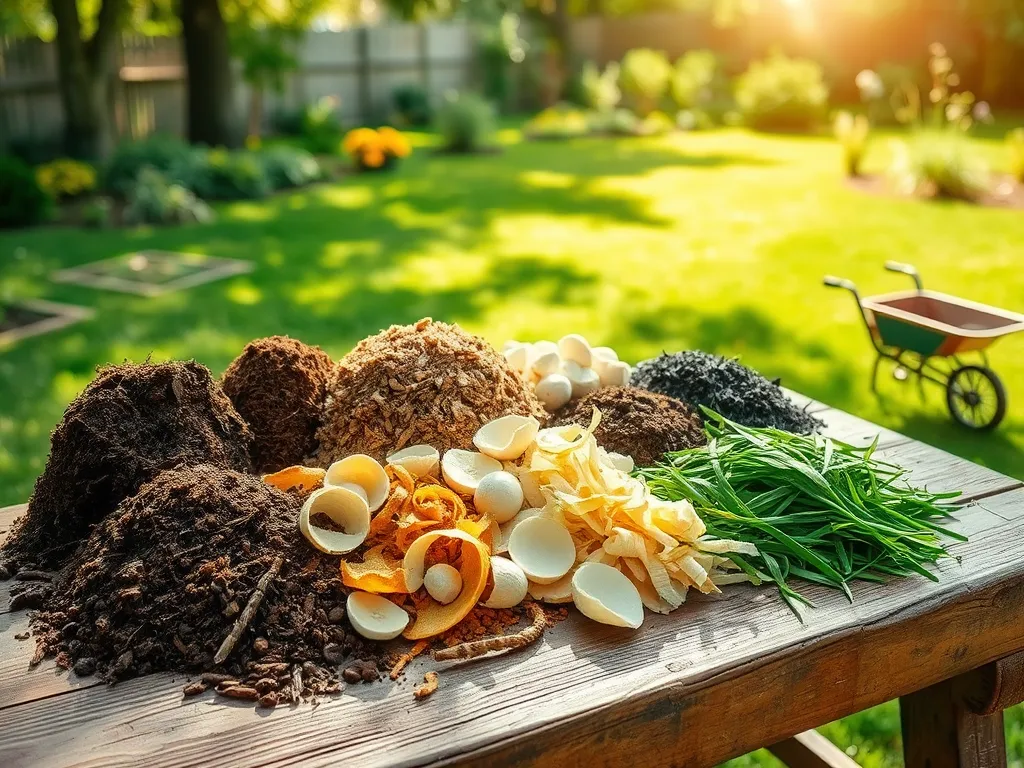Top Homemade Organic Fertilizer Recipes for Healthy Lawns

Homemade Organic Fertilizer Recipes for Lawns
Maintaining a lush, green lawn doesn't always have to come at the expense of the environment or your wallet. Homemade organic fertilizer recipes for lawns are an excellent alternative to chemical fertilizers, providing essential nutrients while also promoting soil health. By utilizing readily available materials, you can create effective and eco-friendly fertilizers that nourish your lawn naturally.
An eggshell calcium boost can significantly strengthen plant cell walls, promoting better growth and resilience against pests.
Homemade organic fertilizer recipes for lawns allow homeowners to take charge of their lawn care while reducing the impact on the environment. These DIY solutions are not only safer for pets and children but also help to improve soil quality over time. With a variety of ingredients from the kitchen and garden, creating your own organic fertilizers can be a fun and rewarding experience.
Furthermore, homemade organic fertilizers can save you money in the long run. While store-bought fertilizers may seem convenient, they often come with a high price tag. By using common household scraps and organic materials, you can concoct effective fertilizers that cater to the specific needs of your lawn, all while keeping your budget intact.
This article will explore some of the top homemade organic fertilizer recipes for lawns, delve into the benefits of utilizing these natural solutions, and provide practical tips for applying them effectively. Whether you’re a new homeowner or a seasoned gardener, this guide will help you create a vibrant and healthy lawn with ease.
So, roll up your sleeves and get ready to discover the wonderful world of homemade organic fertilizer recipes for lawns that will contribute to a thriving outdoor space.
Benefits of Homemade Organic Fertilizers
One of the most significant benefits of homemade organic fertilizers is the improvement of soil health and structure. Unlike synthetic fertilizers, organic options enrich the soil with beneficial microbes, improving its capacity to retain moisture and nutrients. This leads to a healthier root system and overall plant resilience.
Using grass clipping fertilizer not only nourishes your lawn but also recycles organic waste effectively.
Using homemade organic fertilizers also has a positive environmental impact. By choosing to create your fertilizers, you reduce the reliance on chemical products that may run off into waterways, causing pollution and harming aquatic ecosystems. Organic fertilizers break down naturally, promoting a sustainable cycle.
Another advantage is the cost-effectiveness of DIY fertilizers. Many organic ingredients can be sourced from kitchen scraps or local sources, significantly lowering the expense compared to commercial fertilizers. Not only do you save money, but you also minimize waste by repurposing materials that would otherwise be discarded.
Among the numerous coffee ground benefits, enhancing soil fertility stands out as a sustainable gardening approach.
Homemade organic fertilizers often provide a more balanced nutrient profile compared to their synthetic counterparts. This is because they maintain the natural ratios of macronutrients (nitrogen, phosphorus, and potassium) and micronutrients, ensuring that your lawn receives a well-rounded dietary boost.
Popular Homemade Organic Fertilizer Recipes
One of the simplest and most effective homemade organic fertilizer recipes is compost tea for lawns. To make compost tea, fill a burlap sack with finished compost and steep it in a bucket of water for 24-48 hours. This nutrient-rich liquid can be diluted with more water and applied with a garden sprayer, providing a quick boost to your lawn's health.
Another popular option is banana peel fertilizer, which is high in potassium. Simply chop up banana peels and bury them in your garden soil or blend them with water to create a nutrient-rich slurry that can be used as a liquid fertilizer.
Coffee grounds are also an excellent addition to homemade fertilizers. Rich in nitrogen, they can be sprinkled directly onto the lawn or mixed with compost. Additionally, coffee grounds improve soil texture and promote healthy microbial activity.
Fish emulsion is another powerful homemade fertilizer. By blending fish scraps with water and letting them steep, you create a nutrient-dense solution that can be diluted and applied to the lawn, providing an excellent source of nitrogen and promoting vigorous growth.
Application Techniques for Lawn Fertilizing
Timing can significantly affect the success of organic fertilizer application. The best times to apply organic fertilizers are during the early spring and fall when the grass is growing actively. By aligning fertilizer application with the natural growth cycle of the grass, you ensure maximum nutrient absorption.
There are various methods for applying homemade fertilizers, including spraying, spreading, or using a garden pump or watering can. Spraying lighter liquid fertilizers ensures even distribution, while spreading granular fertilizers can be done using a hand-held spreader for larger lawns.
Before fertilizing, it's a good practice to test your lawn soil. This will help you understand its pH and nutrient levels, allowing you to tailor your homemade fertilizer recipes accordingly. There are DIY soil testing kits available that can simplify this process.
A seasonal fertilizer application guide can help manage the feeding schedule of your lawn. For example, a light feeding in early spring can promote lush growth, while a second application in early fall will prepare the lawn for the winter months. Adjust your recipes based on the specific needs of your lawn for the best results.
Ingredients for Homemade Fertilizers
Common kitchen waste can be a treasure trove for homemade fertilizers. Items like vegetable scraps, eggshells, and coffee grounds are all nutrient-dense and can be easily repurposed for lawn health. By utilizing everyday waste, you're not only saving money but also reducing landfill contributions.
Natural minerals such as rock phosphate or greensand can be mixed into homemade fertilizers to provide additional nutrients. These minerals are readily available at garden centers and can enhance the effectiveness of your DIY solutions.
Sourcing organic materials locally is another fantastic way to create homemade fertilizers. Local farms, community gardens, or even friends who compost can provide you with a wealth of organic waste materials that can be transformed into nutrient-rich fertilizers.
Animal manure is a powerful ingredient for homemade fertilizers. Whether it's chicken, cow, or horse manure, these natural fertilizers are rich in nitrogen and can significantly boost lawn health. Be sure to compost the manure before use to eliminate pathogens and ensure safe application.
Troubleshooting Common Lawn Issues
Identifying nutrient deficiencies in your lawn can be confusing. Symptoms may include yellowing leaves, stunted growth, or poor development. Conducting soil tests can help you understand what nutrients may be lacking and how to adjust your homemade fertilizer recipes accordingly.
Signs of over-fertilization can also present notable challenges. These include burnt grass tips, excessive growth, and increased susceptibility to pests and diseases. It's crucial to follow recommended application rates to avoid these issues.
Pest management can be done effectively using organic methods as well. Homemade solutions like insecticidal soap or neem oil can deter pests from damaging your lawn while being safe for beneficial insects and the environment.
Combining different homemade fertilizers can yield better results as well. For instance, blending compost tea with fish emulsion can provide a comprehensive nutrient boost, addressing multiple deficiencies simultaneously and optimizing lawn health.
